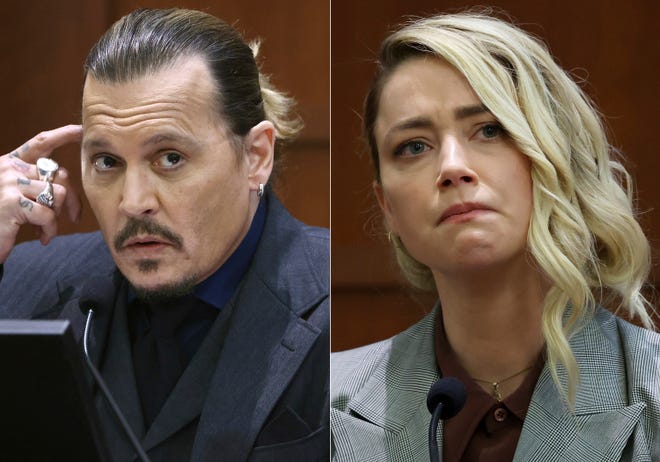
This article is more than
2 year oldJonathan Majors' arrest is still a developing story, but that hasn't stopped the internet from jumping to conclusions.
Majors, the 33-year-old “Creed III” and “Ant-Man and the Wasp: Quantumania” star, was arrested over the weekend after an alleged domestic violence incident with a 30-year-old woman.
The public response has been swift and severe. Tweets, comments and reactions were divided into two opposing camps, both presenting problematic, all-or-nothing thinking. There were those who pointed the finger at the alleged victim, quickly attempting to discredit a woman who claimed to be a victim of domestic abuse, and those who labeled Majors as guilty, regardless of the murky details and the fact that Black men historically face more frequent and harsher punishments than their white counterparts.
We don't have all the answers as to what happened, but the instinct to pick a person to vilify says a lot about the state of our culture, experts say.

Those with expertise in trauma and domestic violence note that when people choose to weigh in with opinions about the alleged abuser, be it positive or negative, before expressing care for the alleged victim in a situation like this, it perpetuates ideas to the rest of the world about who is more important.
"Be mindful that Jonathan Majors isn't reading your tweets," tweeted Darius A. Green, who has a Ph.D. in counselor education. "Folks who have survived/are experiencing abuse are as well as folks who have abused/are abusing others. Those are the folks you are communicating to."
Intimate partner violence – which can be physical, sexual, emotional or economic – is a public health problem that affects millions of people in the United States each year, according to the Centers for Disease Control and Prevention. About 1 in 4 women and nearly 1 in 10 men have experienced some form of intimate partner violence.

Psychologists say many people don't want to believe someone who has qualities they admire could be capable of harm. Think back to the way the public quickly sided with Johnny Depp in his defamation trial against Amber Heard, making memes, videos and a mockery of her testimony.
"When you already want to believe something, you need less evidence to keep believing it and you're more willing to accept any evidence that is in favor of it without thinking more deeply about it," David Pizarro, a professor in the Department of Psychology at Cornell University who studies how biases affect moral judgment, previously told USA TODAY. "When you're presented with information that goes contrary to what you believe, then you actually start thinking more deeply about it in order to counterargue."
Conversely, because Majors hasn't been proven guilty, experts say the public should exercise caution in painting him as the bad guy – especially because Black men tend to face more swift consequences for alleged actions than their white counterparts.
Black male offenders on average receive sentences 19.1% longer than white male offenders in similar cases, according to a 2017 study from the U.S. Sentencing Commission. And anecdotally, many feel that the same can be said for social repercussions in situations like this.
"When you make comparison of people in similar situations, (white men) have nowhere near (the amount of) public criticism as Jonathan Majors has gone through," says celebrity therapist and mental health expert Jeff Rocker. "White males are given the benefit of the doubt."
As more developments unfold, all eyes will be on the existing Hollywood projects Majors is attached to. The Army immediately pulled a planned ad campaign starring Majors. But the actor is also slated for appearances in future Marvel films, and will star this winter in bodybuilding drama "Magazine Dreams," which garnered buzz out of this year's Sundance Film Festival.

Some on social media have argued that Majors losing the Army campaign proves a double standard in the industry; Ezra Miller has faced a string abuse allegations and legal woes over the last year, but is still slated to star in the titular role of Warner Bros.' "The Flash" this summer.
Ultimately, those participating in online discourse about the case need to consider the messaging they're putting into the world – online reactions can often "work to further harm," Deborah J. Vagins, former president and CEO of the National Network to End Domestic Violence, previously told USA TODAY.
"From the headlines to the memes to the hashtags, these messages are perpetuating stigma ... operating to further isolate and silence survivors," Vagins said. "It’s not just the survivors who are listening, perpetrators are also listening."
"Take your time before you judge people," Rocker adds. "Don't do it prematurely without knowing all the details."
All the details so far:Jonathan Majors faces assault, harassment charges after alleged altercation
Former Nickelodeon star Drake bells's victim calls pain 'indescribable.' How wholesome celebrities exploit young audiences to abuse.
More:Amber Heard, Johnny Depp and who we choose to believe
And:Angelina Jolie, Brad Pitt and why our reactions matter
Contributing: Alia E. Dastagir